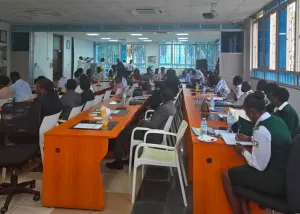
Mr. President, the lives of Ugandans had been reduced to near destitute. These were the statistics in 1986; household income poverty stood at 58.4%, per capita income was $60, inflation was galloping at 137%, GDP growth was 0.3%, total GDP was a mere US$3.9 billion, we were saving only 5% of the GDP, external debt stood at $1.4 billion (37% of GDP), etc. I picked these figures from the Background to the Budget of 1987/88, and corroborated them with World Bank and International Monetary Fund (IMF) data.
Mr. President, when you and your colleagues from Luwero bushes arrived in Kampala and asked a question; “why is Uganda doing so badly?”, the World Bank, the IMF, and the U.S. Treasury were quick to respond in unison, “government is the problem.”
So, these multilateral agencies and Western donors asked you to find ways of getting government out of the economy. They proposed that you liberalise (free markets of any controls and allows forces of demand and supply to answer all questions), deregulate (remove state regulations on trade, banks and other services), and privatise (to transfer ownership of property and businesses from the government to the private sector). In total they proposed 10 policy reforms in what came to be known as the “Washington Consensus”.
Their view was that the economy was being ruined by government failures. So the strategy was to get government out of the way and allow the economy to flourish, create jobs, eradicate poverty and inequalities, and get it integrated in the global economy.
The real question today is; have we realised the benefits that these policy architects promised us? Definitely the response to this question depends on who is giving the answer. A few elites will tell you the policies have succeeded, mainly because those few elites and other agents of globalization have themselves benefited. However, the masses that have been limited to being spectators of globalization, or at worst its victims, will tell you the star of liberalisation, privatization, and deregulation hasn’t sworn at all.
Macro-stability?! Without jobs?!
Someone more inquisitive would pose another question; “Why is it that countries that either declined to heed the demands of the World Bank, IMF, WTO, and Western-based academics, are the ones that have since emerged out of poverty?
We all know the story of East Asian growth miracle performers (South Korea, Hong Kong, Singapore, Taiwan, and China). These are countries which were as poor as we were in the 1960s, but registered mind-boggling growth rates and are now at upper middle income levels and well on the way to becoming rich economies. Add to those countries a few others such as India, Vietnam, Botswana, Seychelles, and Mauritius that are on the steady path to prosperity.
These are countries that used heterodox policies (as opposed to orthodox policies) to liberalise. They did not focus only on price stability but on real stability, ensuring that new jobs were created in pace with new entrants to the labour force; that the benefits of growth were widely shared; that the growth was sustainable; and that poverty reduced. They liberalised gradually and pragmatically.
Mr. President, your government has since 1987 got embroiled in maintaining macroeconomic stability, by putting all your attention to price stability, as unemployment and income disparities hit unacceptably high levels.
You guys in NRM also failed to do what successful globalizers did — distinguish between pro-market reforms and pro-business reforms. Removing impediments to markets through economic liberalisation is a pro-market reform. It favours new entrants and consumers. Pro-business policies, on the other hand, focus on building the capacity of the established industrial and commercial establishments. So they favour incumbents and producers. Those countries you visit regularly in East Asia became successful because they invested heavily in education and research, an effort that enhanced the growth of technology.
Need for home-grown policies
They also embraced gradualism and sequencing in policy reform which enabled them to succeed at implementing unpopular-but-fundamental policies. For example, when India was privatizing, it applied the policy only to loss-making units, in belief that private entrepreneurs would do a better job, and to units where no strategic interests were being served. In all other cases the process was limited to selling minority shares in public enterprises (described as ‘disinvestment’) rather than outright privatisation.
They also built markets underpinned by regulation. The wisdom that guided liberalisation in East Asia and a few other African, South Asian, and Latin American countries was that liberalisation did not mean deregulation. They knew that without rules, ‘cheaters’ would take advantage of the vulnerable and the poor to extort money. They knew that cheaters would use the old free market trick of confining customers in a tight spot and make them pay a higher price-a contemporary of Julius Caesar’s ploy who made a fortune in early Rome with a private fire company that would negotiate a price for extinguishing the fire as it was raging.
This is exactly what is happening in Uganda today. Unlike us, serious countries knew that lack of checks and balances on greed could prevent economic development just as a lack of markets was doing.
The success stories also fashioned their own particular brands of economic management. China, India, Vietnam, Singapore, and Botswana embraced home-grown development, without much influence by “experts” from Washington or much contribution by foreign aid. In Malaysia, the government designed three public policies — the New Economy Policy (1971-1990); the National Development Policy (1991-2000); and Vision 2020 — and implemented them to the latter leading to the splendid long term growth they have achieved.
In 1980s, Singaporean government embarked on a programme of economic restructuring that spurred long-term growth. They modified education policies, invested heavily in technology and computer education, offered financial incentives to industrial enterprises and launched productivity campaign. Heavy investments in public housing were given top priority, and in the subsequent years Singapore’s economy was to grow by 8% and above, generating per capita incomes as large as $54,000 today!
Football without a referee
Mr. President, one of the biggest failures of your long presidency has been your surprise willingness to become an agent of the World Bank. You were known to be a Marxist. When you were convinced, beginning in 1987, that market economics works better, you wanted to become more catholic than the Pope you visited recently. When you were asked to liberalise, you sent all regulators home and publicly denounced a few sensible public officials that tried to manage the liberalisation process as “backward”, “detractors”, “economic saboteurs”, or “primitive” bureaucrats who were chasing away investors.
When you were asked to deregulate trade and open up for globalization, you simply plucked out the door. In the process Uganda was turned into a guinea pig where the world’s products are tested! When you were asked to privatise and reduce government inefficiencies in the economy, you nearly sold government itself! You never put anything in context.
In 2005, the World Bank itself penned a paper in which it recognised that “different policies can yield the same result, and the same policy can yield different results, depending on country institutional contexts and underlying growth strategies.”
Several events have occurred here and around the world that point to the fact that we might have liberalised too far and too fast. The critical nerve of any economy is the health of its financial sector. Recently the world underwent a financial crisis that degenerated into a global economic crisis. The world suffered this crisis mainly because banks were no longer taking prudential measures to protect depositors and savers.
Liberalisation had forced central banks and other regulators to lose their freedom to impose the prudential regulations necessary to keep the financial systems stable. Again only those countries that have these measures in place survived the crisis.
I have written several articles in these very pages urging your government to step up regulation of these foreign banks to stop them from predatory lending and cheating of depositors.
Mr. President, we are tired of hearing the line “Ours is a free market economy; we have nothing to do.” And please tell all your colleagues, your agents at Bank of Uganda and Ministry of Finance, and public servants that the world since has moved on from that stance. Tell them that some degree of consensus has already emerged that over liberalization of the economy hurts economic performance.
All successful or emerging economies around the world regulate their markets. For us we are behaving as if markets are self-regulating. It’s like playing football without a referee! Such games are typical in villages of Uganda, and they often end in what we are watching in our equally ill-refereed economy — chaos!













Ramathan Ggoobi
Ramathan Ggoobi is Policy Analyst, and Researcher. He lecturers economics at Makerere University Business School (MUBS) and has co-authored several studies on Uganda's economy. For the past ten years, he has published a weekly column 'Are You Listening Mr. President' in The Sunrise Newspaper, Uganda's Leading Weekly
Leave a Comment
Your email address will not be published.